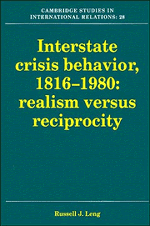Book contents
- Frontmatter
- Contents
- List of figures
- List of tables
- Preface
- 1 REALIST AND PSYCHOLOGICAL PERSPECTIVES
- 2 METHODOLOGY
- 3 THE CRISIS STRUCTURE AND WAR
- 4 PATTERNS OF BEHAVIOR
- 5 STRUCTURE, BEHAVIOR, AND OUTCOMES
- 6 INFLUENCE TACTICS
- 7 INFLUENCE STRATEGIES
- 8 RECIPROCATING INFLUENCE STRATEGIES
- 9 SUMMARY AND CONCLUSION
- EPILOGUE: THE 1990–1991 CRISIS IN THE PERSIAN GULF
- Appendices
- Notes
- References
- Index of names
- Index of subjects
- Titles in the series
2 - METHODOLOGY
Published online by Cambridge University Press: 05 February 2010
- Frontmatter
- Contents
- List of figures
- List of tables
- Preface
- 1 REALIST AND PSYCHOLOGICAL PERSPECTIVES
- 2 METHODOLOGY
- 3 THE CRISIS STRUCTURE AND WAR
- 4 PATTERNS OF BEHAVIOR
- 5 STRUCTURE, BEHAVIOR, AND OUTCOMES
- 6 INFLUENCE TACTICS
- 7 INFLUENCE STRATEGIES
- 8 RECIPROCATING INFLUENCE STRATEGIES
- 9 SUMMARY AND CONCLUSION
- EPILOGUE: THE 1990–1991 CRISIS IN THE PERSIAN GULF
- Appendices
- Notes
- References
- Index of names
- Index of subjects
- Titles in the series
Summary
The analyses in succeeding chapters seek answers to two general questions. (1) Have the actions of states in militarized crises been consistent with what would be predicted from a realist perspective? (2) When states in militarized crises have followed the prescriptions of classical realists and conflict strategists, have they been more successful? This chapter describes and defends the research methods employed in seeking answers to these questions. It begins by describing the methodology of the Behavioral Correlates of War (BCOW) project within the context of contemporary research on conflict behavior. Then key concepts are defined; the data generation process is described; and the approach to analysis is described and defended. Readers who are less interested in the “nuts and blots” of empirical research may wish to skip certain sections of this chapter, particularly the detailed discussion of the data generation in the sections entitled “An overview of the data,” and the “BCOW typology and the coding scheme.”
Research on crisis behavior and the BCOW project
The research findings on interstate conflict behavior that are discussed in this book are drawn primarily from four methodological approaches: (1) qualitative case studies; (2) game theory; (3) interpersonal experiments in bargaining; and (4) quantitative studies employing events data. The BCOW project falls into the last category, but, in order to place it in perspective methodologically, it may be useful to start with a brief description of each of the other three approaches.
Qualitative case studies
Qualitative case studies remain the most widely used approach to the study of international crises.
- Type
- Chapter
- Information
- Interstate Crisis Behavior, 1816–1980 , pp. 20 - 44Publisher: Cambridge University PressPrint publication year: 1993

